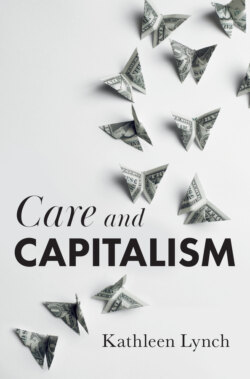Читать книгу Care and Capitalism - Kathleen Lynch - Страница 17
1 Care and Capitalism: Matters of Social Justice and Resistance
ОглавлениеAs the creation, repair and maintenance of human life cannot be undertaken without care (Tronto 1993), the affective relations that produce (or fail to produce) nurture are structural matters that are central to social justice and politics. This chapter examines ways in which the failure to substantively engage with the intellectual, political and economic significance of affective relations of love, care and solidarity has contributed to their misrecognition as sites of injustice (Folbre 1994; Federici 2012; Oksala 2016).
Affective relations are those nurturing-oriented care relations, and nurturing dimensions of other social and species relations, that humans engage in to co-create, support and enrich each other and the non-human world. There are three sociologically distinguishable contexts in which affective relations operate in the social world: the primary sphere of intimate love relations; the secondary sphere of professional, neighbourly and community care relations; and the tertiary sphere of solidarity-led political relations with largely unknown others (Lynch 2007). Care of other species and the environment is a further site of affective relations, albeit not a social-specific one. While each set of care relations is discrete, they are built on mutual trust. When they are broken or defaulted on, they are potentially harmful and abusive. Like all human relations, affective relations are embedded in relations of power, status and wealth that generate conflicts and contradictions within (Lynch, Baker and Lyons 2009; Care Collective 2020).
The chapter opens with a discussion of how affective relations of love, care and solidarity have been peripheralized across different disciplines in the social sciences. It examines the implications of this neglect for sociological and socio-political understandings of nurturing as a site of praxis and politics. Following this, an analysis of the different dimensions and forms of affective relations is presented, and the reasons why affective inequalities matter for social justice are explored. The third section is devoted to analysing how neoliberal capitalism promotes carelessness and affective injustices by undermining people’s capabilities and resources for nurturing work. Finally, the chapter explores how the unincorporated and previously silenced political character of affective relations makes it a residual space (Williams 1977), a site of resistance for radical political thinking at an ideological level.
The neediness of the human condition leads to interdependencies that generate feelings of belonging, appreciation, intimacy and joy, but also feelings of ambivalence and anxiety, tension and fear. It is only when we acknowledge the challenging reality of our shared dependence, and the irreducible differences between us, that we can fully appreciate what a new politics of care might involve (Care Collective 2020: 21–31).
